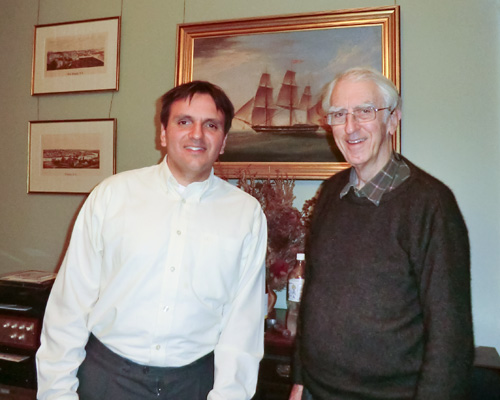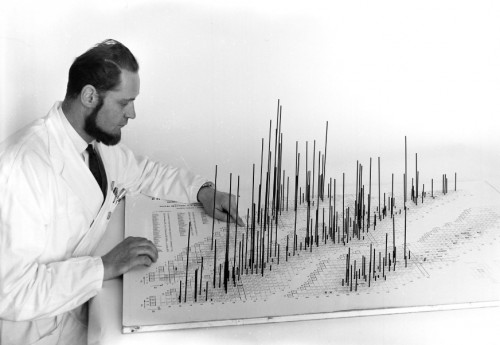Tag archives: science journalism
Snooker cues, negative mass, apps for waiting and CERN croissants
By Sarah Tesh
With the World Snooker Championship taking place at the moment, it’s that time of year when those of us who are usually snookered by the game are suddenly in its pockets. Right on cue, Phil Sutton from Loughborough University in the UK helps bridge the gap between science and snooker. In his video big break, he looks at why players use chalk on their cue tips. Interestingly, there is a right way to help you spin out a 147 and a wrong way that could leave you pocketing the white.
View all posts by this author | View this author's profile
Strange goings on at CERN, string theory with cats, Isaac Asimov on generating new ideas and more
By Hamish Johnston
“The past is a foreign country: they do things differently there,” is probably the only famous sentence written by the English novelist L P Hartley. It also sums up nicely a collection of photographs of CERN in the 1960s and early 1970s showing among other things a jolly worker wearing a beret, scientists wearing white lab coats and ties, and a strange religious-like procession. There are also lots of photos of vintage kit, including one of those huge vacuum-valve-powered oscilloscopes (probably from Tektronix) that would be familiar to physicists of a certain age. My favourite photo is shown above. It was taken in 1965, when 3D data visualization was actually done in 3D! I believe that the collection was put together by CERN’s Alex Brown and you can enjoy looking at all 55 images in the collection here.
View all posts by this author | View this author's profile
What can you learn at a quantum ‘boot camp’?
By Tushna Commissariat in Stockholm, Sweden
Google the word “quantum” and take a look at what comes up.

In addition to the obvious news articles about the latest developments in the field and the Wikipedia entries on quantum mechanics, you’ll undoubtedly come across a heap of other, seemingly random, stories.
I found, for example, a David Bowie song being compared to a quantum wavefunction (by none other than British science popularizer Brian Cox), as well as a new cruise ship being named Quantum of the Seas. Then there’s the usual jumble of pseudo-scientific “wellness” therapies that misguidedly adopt the word in a strange attempt to give their treatments some sort of credibility.
So while it seems that everyone is talking about quantum something or other, how much do we really understand this notoriously difficult subject? More to the point, how much do science journalists, like me, really know about the subject? I write stories about quantum mechanics from time to time for Physics World and the subject can, I assure you, be fiendish and quite mind-bending.
Australian science communicator Peter Pockley dies

Peter Pockley (right) at his his home in Sydney in 2011 with Matin Durrani.
By Matin Durrani
Physics World was saddened to learn today – via a Tweet from the Australian Nobel-prize-winning astronomer Brian Schmidt – of the death of veteran Australian science journalist Peter Pockley.
Peter, who was 78, had contributed numerous articles to Physics World over the years, focusing mainly on the ups and downs of science policy in Australia, of which he had an in-depth knowledge. He died peacefully at his home in Sydney on 11 August 2013.
View all posts by this author | View this author's profile
Institute of Physics launches new blog

Jim Al Khalili joins the ranks of physicsfocus bloggers.
By Hamish Johnston
The Institute of Physics has just launched a new blog called physicsfocus that is described as “an online space for the physics community to read about and comment on issues that concern them”.
View all posts by this author | View this author's profile
Teaching an old blog new tricks
By Hamish Johnston

(iStockphoto/webphotographeer)
When the Physics World editorial team started blogging in earnest early in 2008, it was our first chance to interact much more directly and informally with the physics community – prior to that we had been mainly restricted to conventional news stories and features. Since then, of course, the social-media world has grown out of all recognition and Physics World is now on Twitter, Facebook, Flickr, Google+ and YouTube, with these sites giving us new ways of communicating with you (and vice versa).
But we think the Physics World blog still has a big role to play in what we do and today marks a major upgrade to it. While most of the improvements are behind the scenes, I thought I’d mention a few new features we hope you’ll enjoy.
View all posts by this author | View this author's profile
